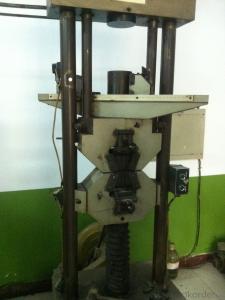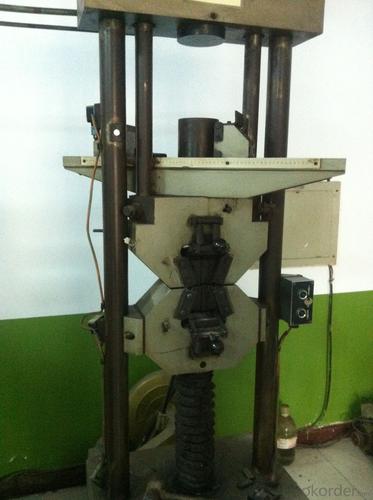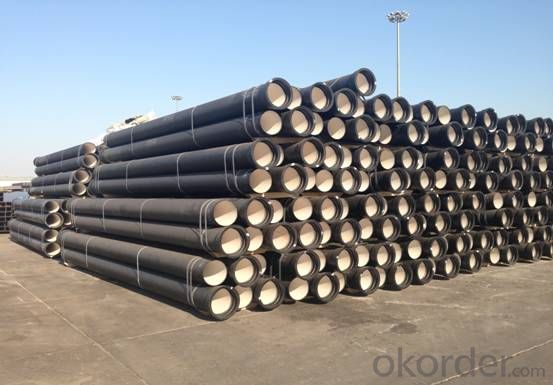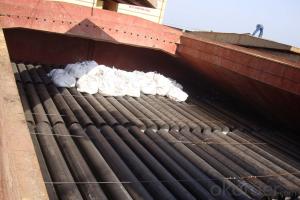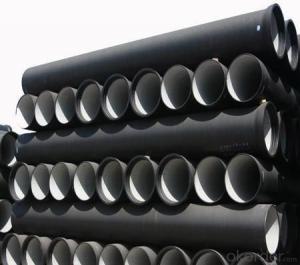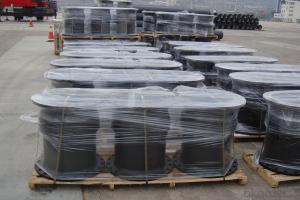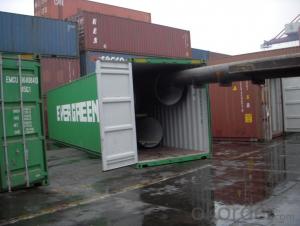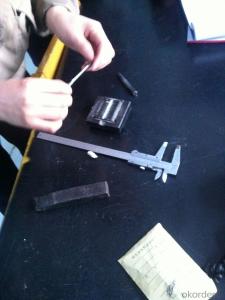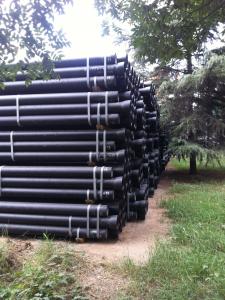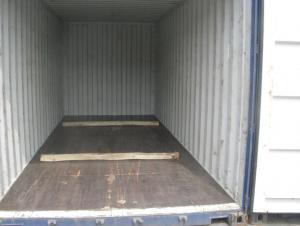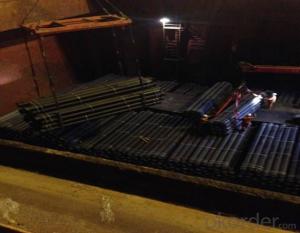DUCTILE IRON PIPE AND PIPE FITTINGS K8 CLASS DN150
- Loading Port:
- Tianjin
- Payment Terms:
- TT OR LC
- Min Order Qty:
- 23 pc
- Supply Capability:
- 3000 pc/month
OKorder Service Pledge
OKorder Financial Service
You Might Also Like
Material : Ductile Cast Iron
Size Range : DN 80mm to DN 2000mm
Unit Effective Length : 6m or 5.7m
Manufacture Standard: ISO 2531:1998/ EN 545:2006/EN 598:2007
Annual capacity : 200,000 tons
Coating Exterior: Zinc 130g/m2 according to ISO 8179-1 and bitumen coating 70 microns.
Cement Interior: Portland Cement/ High Alumina Cement/ Sulphate Resisting Cement Lining according to ISO 4179
Special requirements on external coating and internal lining can be applied
We also provide accessories such as SBR/EPDM rubber gaskets, lubricant paste, pipe caps, PE sleeves, etc.
Additional Parts:
Each pipe is strictly inspected according to related standard to ensure permanently high performance.
Easy Installation at site and service free for life
Long Service Lifespan
Quotation will arrive you within 24hours once we get your inquiry.
We guarantee offering you a competitive price.
A copy of original inspection reports of pipes will be offered after shipment.
Photos of loading process will be sent to the customer after shipment effect.
We will follow-up the delivery progress after shipment effect and update to the customer on weekly basis.
- Q: Steel plastic pipe, ductile iron pipe, steel pipe difference
- The steel plastic pipe, the outer layer is made of steel, the inner cover of organic material, not easy to transport corrosive medium, suitable for delivery of utilities, tap water and toxic corrosive medium, not suitable for high temperature medium, pipe price is high, very difficult to install and manufacturers warranty period is generally 10 years.
- Q: How are ductile iron pipes protected against internal corrosion?
- Ductile iron pipes are protected against internal corrosion through a process called cement mortar lining. This involves applying a layer of cement mortar to the inner surface of the pipe, creating a protective barrier between the iron and the water flowing through it. This lining helps to prevent the formation of rust, corrosion, and scale build-up, ensuring the longevity and durability of the pipes.
- Q: Can ductile iron pipe be used for underground storage tank systems?
- Yes, ductile iron pipe can be used for underground storage tank systems. Ductile iron is a strong and durable material that is resistant to corrosion and can withstand the pressure and load requirements of underground storage systems.
- Q: How is ductile iron different from cast iron?
- Ductile iron is different from cast iron in terms of its composition and mechanical properties. While both are types of iron alloys, ductile iron contains small amounts of additional elements, such as carbon, silicon, and magnesium, which enhance its strength, ductility, and impact resistance. This makes ductile iron more flexible and less brittle compared to cast iron. Additionally, ductile iron has a higher tensile strength and can withstand higher pressure and stress, making it suitable for applications where cast iron may fail.
- Q: Are there any alternatives to ductile iron pipe for water distribution?
- There are various options available for water distribution besides ductile iron pipe. Some commonly used alternatives include: 1. PVC (Polyvinyl Chloride) Pipe: PVC pipe is frequently chosen for water distribution due to its affordability, durability, and resistance to corrosion. It is lightweight, easy to install, and requires minimal maintenance. 2. HDPE (High-Density Polyethylene) Pipe: HDPE pipe is a flexible and durable choice for water distribution. It is resistant to corrosion, chemicals, and UV rays, making it suitable for both aboveground and underground installations. HDPE pipe is also known for its leak-free joints and long lifespan. 3. PEX (Cross-linked Polyethylene) Pipe: PEX pipe, a flexible plastic pipe, is commonly utilized for water distribution in residential and commercial settings. It is recognized for its ability to withstand freezing, scaling, and corrosion. PEX pipe is easy to install, has fewer joints, and is highly durable. 4. Copper Pipe: Copper pipe has a long history of use in water distribution due to its exceptional resistance to corrosion and extended lifespan. Although it is more expensive than other alternatives, copper pipe is renowned for its reliability and ability to handle high pressure. 5. Steel Pipe: Steel pipe is a robust and durable option for water distribution, particularly in high-pressure scenarios. It can endure extreme temperatures and resist external loads. However, steel pipe is more costly and requires specialized installation techniques. When selecting an alternative to ductile iron pipe for water distribution, it is crucial to consider factors such as cost, durability, corrosion resistance, installation requirements, and specific project needs.
- Q: What are the typical joint sealing requirements for ductile iron pipes under pressure?
- The typical joint sealing requirements for ductile iron pipes under pressure involve the use of gaskets and mechanical joints to ensure a leak-free connection. Gaskets are typically made of rubber or synthetic materials and are placed between the pipe ends to create a tight seal. These gaskets are designed to withstand the pressure of the flowing fluid and prevent any leakage. They also provide flexibility to accommodate for any slight misalignment or movement of the pipes. Mechanical joints, such as push-on joints or restrained joints, are another common method of sealing ductile iron pipes. These joints consist of a mechanical connection that securely holds the pipe ends together. They can provide a reliable seal without the need for additional gaskets. In addition to gaskets and mechanical joints, proper installation techniques are crucial for ensuring effective joint sealing. This includes proper alignment of the pipes, correct tightening of bolts or screws, and the use of appropriate lubricants or sealants. It is important to note that the specific joint sealing requirements for ductile iron pipes under pressure may vary depending on the application, the type of fluid being transported, and the applicable industry standards or regulations. Therefore, it is essential to consult the manufacturer's guidelines and relevant codes to determine the appropriate joint sealing requirements for a specific project.
- Q: How are ductile iron pipes tested for quality assurance?
- Ductile iron pipes undergo various testing procedures to ensure their quality and meet industry standards. These quality assurance tests are conducted on both raw materials and finished products to ensure the durability, strength, and overall reliability of ductile iron pipes. One of the initial tests is the chemical analysis of the raw materials used in manufacturing the pipes. This analysis ensures that the composition of the iron, carbon, and other elements is within the specified range, as different compositions can affect the pipe's strength and corrosion resistance. Next, mechanical tests are performed to evaluate the strength and ductility of the pipes. Tensile tests are conducted to determine the ultimate tensile strength, yield strength, and elongation properties of the pipe. This helps in assessing the pipe's ability to withstand external pressure or bending forces. Additionally, impact tests are performed to evaluate the pipe's resistance to sudden loading or impact. This test measures the energy absorbed by the pipe when subjected to a high impact force, ensuring that it can withstand potential accidental impacts during installation or operation. Another critical test is the hydrostatic pressure test, which checks the pipes' ability to withstand internal pressure. In this test, the pipes are filled with water and subjected to a specified pressure for a specific duration. This ensures that the pipes can withstand the expected operating pressure without any leakage or failure. Furthermore, dimensional and visual inspections are conducted to ensure that the pipes meet the required specifications. These inspections include checking the pipe's outer diameter, length, wall thickness, and overall appearance for any defects, such as cracks, voids, or irregularities. Lastly, corrosion resistance tests are performed to assess the pipe's ability to resist corrosion when exposed to different environments or fluids. This helps in determining the expected lifespan of the pipes and their suitability for various applications. Overall, these quality assurance tests play a crucial role in ensuring that ductile iron pipes meet the required standards and provide reliable and long-lasting performance in various infrastructure projects.
- Q: Is there any cast iron pipe used in the fire hose?
- I don't know, I only know that the fire pipes produced by our company is the base tube is a pipe, and then coated with a corrosion and non-toxic, long service life, we are Suzhou Yuyao Pipe Industry Co. Ltd. is a professional production of the manufacturers, oh
- Q: Which is good for water polo cast iron pipe steel pipe?
- The advantage of ductile iron pipe is cheap, corrosion resistance, lack of toughness is poor, not easy to process
- Q: Are ductile iron pipes suitable for horizontal directional drilling?
- Yes, ductile iron pipes are suitable for horizontal directional drilling due to their high strength and flexibility, which allows them to withstand the stress and bending forces during the drilling process.
Send your message to us
DUCTILE IRON PIPE AND PIPE FITTINGS K8 CLASS DN150
- Loading Port:
- Tianjin
- Payment Terms:
- TT OR LC
- Min Order Qty:
- 23 pc
- Supply Capability:
- 3000 pc/month
OKorder Service Pledge
OKorder Financial Service
Similar products
Hot products
Hot Searches
Related keywords
